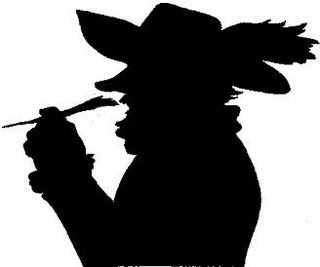
Here's a terrific one (above). It has it all: beautiful color and rendering, demons, advice from the Devil, and levitating women. Be sure to click to enlarge. You can hardly see what's going on in this tiny version.

I love this one (above). The color isn't as good, but the idea is wonderful: I'm guessing it's about an infidel magician who has penetrated into the secret enclave of a Moorish death cult. He's exposed when he tries to help a girl who's about to be sacrificed to a man-eating tiger. Only his knowledge of magic can save them now.
I don't like this poster (above). I'm a cartoonist but I take magic seriously, and I don't like to see it treated lightly as it is here.

Beautiful technique (above), but where's he rushing to? It's as if his magical powers were less important than a sale at Macy's.

Here's a good one (above). Thurston is presented as a scholar of the mystical arts. He's surrounded my mischievous demons and imps.

Another nice one (above), though the reproduction could be more colorful. Blackstone is portrayed as a man of such enormous power and mystical knowledge that his very presence rends the curtain that separates us from the demon world, and creatures from that place spill into our world all around him.

I don't know why, but the idea of lots of objects (above) floating in the air around a tied-up person intrigues me.

I like posters and magic tricks that are about cabinets (above). When we enclose a space we seem to steal that space from the nether world, and it becomes full of magical potential.

Another terrific Kellar poster (above)! The magician's presence has attracted demons who delight in helping him ensnare a space which is alive with mystical energy.

Awesome! The magician has revealed secrets to the audience (above) which were so fantastic and beyond our understanding, that he's driven his audience mad. Well, they can't say they didn't get their money's worth.

















































